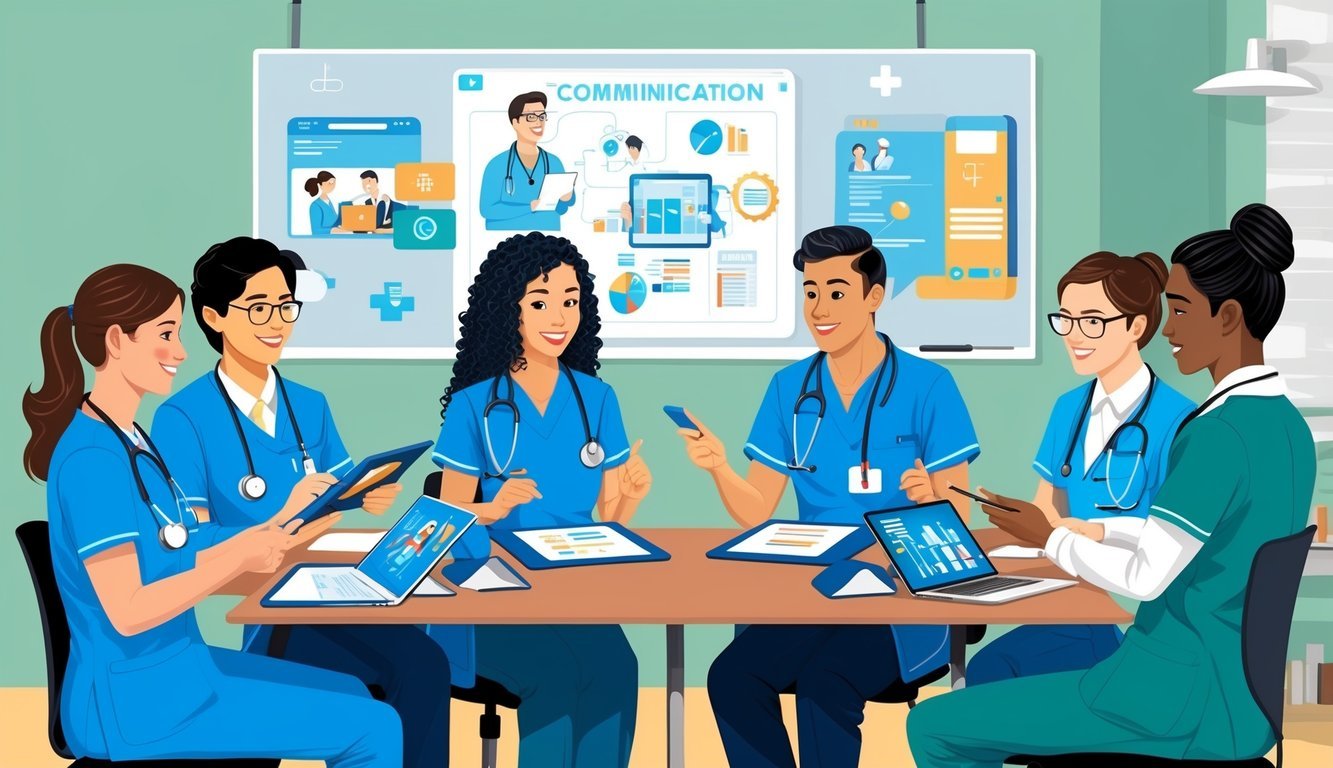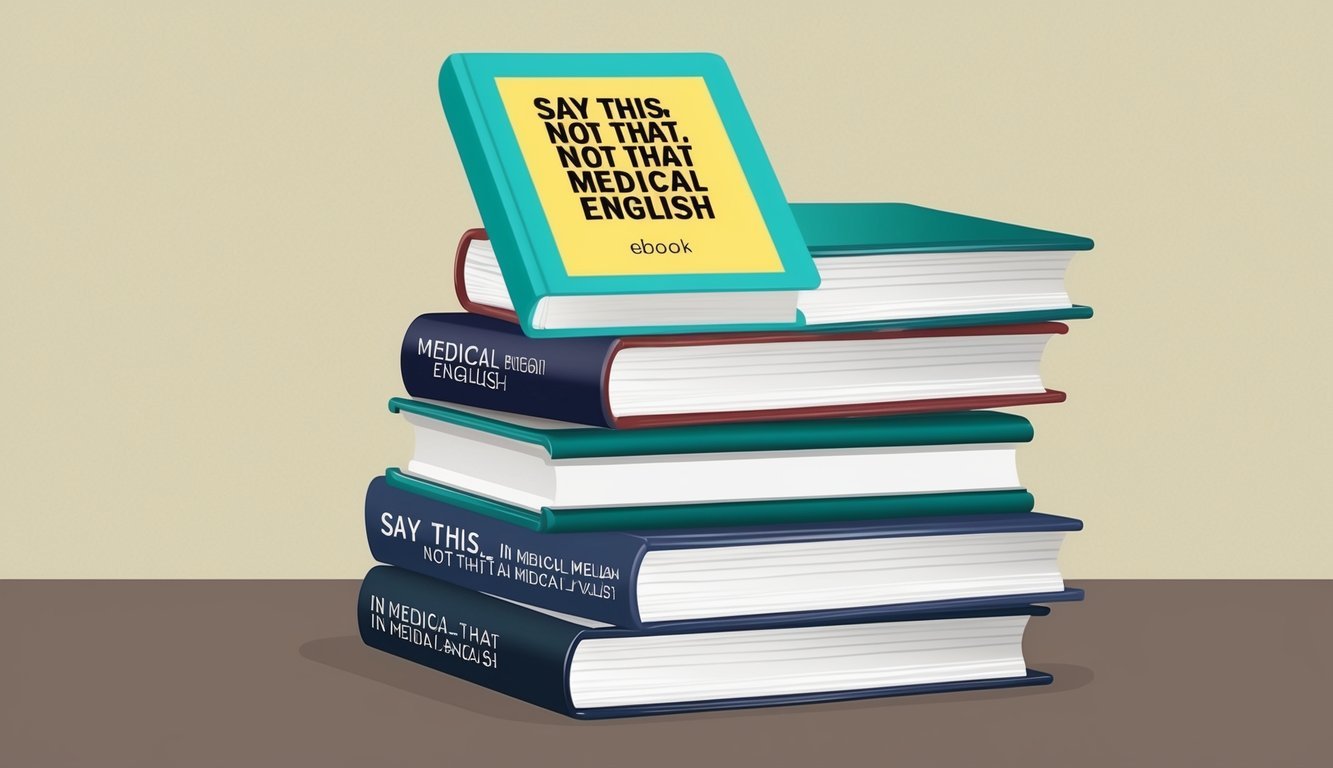Communication is key in the healthcare field.
Whether you’re a professional or a student, strong English skills can make a big difference in how effectively you connect with patients and colleagues. Finding the best training resources can help you improve your communication skills and enhance your career in healthcare.

In this article, you’ll discover a variety of training tools specifically designed for healthcare communication.
From online courses to practical guides, these resources are tailored to meet your needs.
You’ll be on your way to mastering the English skills necessary for a successful career in healthcare.
English for Healthcare by Cambridge University

“English for Healthcare” by Cambridge University is a solid choice for anyone looking to improve their medical English skills.
This resource is helpful for both students and professionals in the healthcare field.
The material covers important topics like patient communication, medical terminology, and report writing.
You’ll find practical exercises and real-life scenarios to help you practice what you learn.
One of the great features is that the resources are designed to fit different learning levels.
Whether you are at a pre-intermediate or advanced level, you can find useful content tailored to your needs.
You can use the materials for self-study or in a classroom setting.
Whichever way you choose, you’ll gain confidence in your ability to communicate effectively in English within the healthcare environment.
Cambridge’s focus on real situations makes this resource relevant for your daily work.
Whether you are preparing for the Occupational English Test or just want to improve, this resource is worth checking out.
“Communicating with Patients” online course by Alison

The “Communicating with Patients” online course by Alison is a valuable resource for healthcare professionals.
You’ll learn essential skills for effective communication with patients.
This course covers various topics, including how to understand patients better.
You’ll focus on techniques that help build trust and improve patient care.
You will also explore different communication styles.
This helps you connect with patients from diverse backgrounds, making your interactions more meaningful.
The course is self-paced, allowing you to learn whenever it suits you.
You can easily fit it into your busy schedule.
By completing this course, you gain a certificate that showcases your commitment to improving patient communication.
It’s a great addition to your professional development.
If you want to enhance your skills in this area, consider taking the course.
It’s a simple way to boost your confidence when talking with patients.
“Medical English in Use” textbook

“Medical English in Use” is a practical resource for healthcare professionals.
It focuses on the language needed for real-life scenarios you may encounter in your work.
The textbook covers key terms and phrases used in various medical settings.
It helps you improve your communication skills, making it easier to speak with patients and colleagues.
You’ll find exercises that reinforce learning through practice.
This approach helps you grasp complex medical vocabulary and apply it confidently.
Whether you’re a doctor, nurse, or paramedic, this book is designed for your needs.
It offers straightforward explanations and examples that make understanding easier.
Using this textbook can enhance your professional skills.
You’ll feel more prepared to handle conversations in English in your daily work.
Healthcare English: As Simple as Simplifying Podcast

If you’re looking to improve your healthcare English, the “As Simple as Simplifying” podcast is a great choice.
This show focuses on making complex medical terms easier to understand.
Each episode tackles a specific topic, breaking down tricky phrases and terminology.
You’ll find practical examples that you can use in real-life situations.
This helps you feel more confident when communicating with patients or colleagues.
Listeners often appreciate the friendly and clear style of the hosts.
They make learning feel less overwhelming, which is perfect for anyone new to medical English.
The podcast is suitable for all levels, so whether you’re just starting or want to brush up on your skills, you’ll find something useful.
It’s a wonderful tool to complement your healthcare training.
Check it out to gain insight and enhance your language skills in the healthcare setting.
5) ESL Healthcare Communication Video Series on YouTube
YouTube offers a variety of ESL healthcare communication video series that are perfect for learners.
These videos cover essential terms and phrases you need in healthcare settings.
One great option is the Medical English Simplified.
It provides a clear guide for beginners.
You’ll find videos that help you improve your vocabulary and boost your confidence when talking to patients.
Another solid choice is the Medical English Masterclass.
This series dives into more complex topics.
It’s perfect if you want to deepen your understanding.
Don’t miss out on the Master Hospital English Fast.
This video focuses on hospital-specific phrases that are often used.
It’s a practical way to learn and practice.
These video series not only teach you vocabulary but also show you how to apply it in real-life situations.
Just search for these resources, and you’ll be on your way to feeling more comfortable in healthcare communication.
6) Healthcare Communication Skills course on Coursera

The Healthcare Communication Skills course on Coursera is a helpful resource for anyone in the health field.
It focuses on improving both verbal and non-verbal communication skills.
You’ll learn to communicate with clarity and honesty.
This course also covers important aspects like body language, eye contact, and facial expressions.
These skills are crucial when working with patients or colleagues.
Another great feature is the emphasis on emotional intelligence.
Understanding your own emotions and those of others can strengthen your communication.
You can take this course at your own pace.
It’s perfect for busy professionals who want to enhance their skills without a strict schedule.
If you’re looking to boost your communication game in healthcare, this course is a solid choice. You can check it out on Coursera and see how it fits your needs.
7) “Say This, Not That in Medical English” ebook

The “Say This, Not That in Medical English” ebook is a useful tool for healthcare professionals.
It focuses on how to communicate clearly and effectively in medical settings.
This ebook helps you avoid common mistakes that can lead to misunderstandings.
It provides simple phrases to use in specific situations.
You can easily find examples that fit your daily conversations.
You will also discover alternatives to complicated medical jargon.
This makes it easier for patients to understand what you are saying.
Clear communication builds trust and helps patients feel more comfortable.
The ebook is structured for quick reading.
You can dip in and out, finding tips whenever you need them.
It’s perfect for busy healthcare workers who want to improve their skills.
Overall, this resource is about practical tips for everyday situations.
You can apply what you learn right away, improving your communication with patients instantly.
It’s a handy guide for anyone in the healthcare field looking to enhance their English skills.
Understanding English in Healthcare
In the healthcare field, communicating effectively in English is essential.
Clear communication helps ensure patients receive the right care.
It also improves the overall experience for both patients and healthcare workers.
Importance of Clear Communication
Being clear when speaking or writing in English can be a matter of life and death.
Misunderstandings can lead to incorrect treatments or medication errors.
This is why using simple, straightforward language is key.
You should focus on avoiding jargon or complex terms that might confuse patients.
Instead, try to use everyday language.
For example, instead of saying “hypertension,” just say “high blood pressure.” This makes it easier for patients to understand their conditions.
Effective communication also builds trust between you and your patients.
When they feel understood, they’re more likely to share important health information.
This can lead to better diagnoses and treatment plans.
Common Challenges Faced by Non-native Speakers
Non-native speakers face unique hurdles in healthcare settings.
Language barriers often make it difficult to communicate efficiently with patients and colleagues.
This can lead to stress and frustration for everyone involved.
One challenge is understanding medical terminology, which can be complex.
Many terms are not commonly used outside of medical contexts.
Practicing this vocabulary is crucial.
Another issue is differences in accents and pronunciation.
Even fluent speakers may struggle to understand each other due to accent variations.
Utilizing tools like accent reduction apps can help improve your skills.
These resources and regular practice can boost confidence in your communication.
Cultural Sensitivity in Healthcare Communication
Cultural sensitivity is crucial in healthcare communication.
By understanding and respecting diverse backgrounds, you can build stronger relationships with patients and provide better care.
Let’s dive into some key aspects of this important topic.
Building Trust with Patients
Building trust is essential for effective healthcare communication.
When patients feel comfortable, they are more likely to share important health information.
-
Listen Actively: Make sure to listen attentively. This shows that you value their perspective.
-
Show Empathy: Understanding a patient’s feelings helps in creating a supportive environment. A simple acknowledgment of their concerns can go a long way.
-
Be Transparent: Clearly explain procedures and decisions. This openness helps patients feel involved and respected.
Trust is often about consistency.
Ensure that your communication style aligns with a patient’s needs.
This creates a welcoming space for open dialogue.
Respecting Diverse Backgrounds
Respecting cultural backgrounds can greatly enhance patient care.
Different cultures have unique beliefs about health and wellness.
-
Recognize Differences: Each patient may have different traditions, values, and communication styles. Being aware of this can help avoid misunderstandings.
-
Ask, Don’t Assume: When in doubt, ask about preferences. Patients appreciate when you show interest in their culture.
-
Adapt Your Approach: Be flexible in your communication style. For instance, some cultures may prefer a more formal approach, while others favor a casual tone.
Recognizing and respecting these differences fosters better relationships and improves overall patient satisfaction.
Taking the time to understand what matters to your patients will make a positive impact on their healthcare experience.
Advancing Language Skills for Professionals
Improving your language skills is crucial in the healthcare field.
You need to communicate clearly and effectively.
Here are two important aspects to consider: interactive learning techniques and effective feedback.
Interactive Learning Techniques
Interactive techniques can really enhance your learning experience.
For instance, role-playing is a great way to practice medical dialogues.
You can simulate patient interactions, which helps build confidence and fluency.
Another method is online courses and webinars that offer real-time practice.
These platforms often include simulations or chatrooms where you can engage with other learners or professionals.
Group discussions can also be useful.
You can share experiences, ask questions, and learn from each other.
Try joining a local language exchange group or an online community focused on healthcare language skills.
Effective Feedback and Improvement
Feedback is essential for improving your language skills.
Getting constructive criticism helps you understand your strengths and weaknesses.
Consider working with a mentor who can guide you and provide valuable insights.
Peer reviews can also be effective.
Practicing with colleagues and giving each other feedback creates a supportive learning environment.
Make sure to focus on both language and communication techniques.
Another option is to record your conversations.
Listening to yourself can highlight areas for improvement, like pronunciation or clarity.
You can make adjustments based on what you hear.
Staying open to feedback will foster your growth.
Remember, the goal is to communicate effectively, so embrace this process!
Frequently Asked Questions
You might have some questions about improving English communication in healthcare.
Here are answers that can guide you in finding the right resources and strategies for effective communication.
What’s the top training for enhancing English communication in healthcare?
A highly recommended resource is “English for Healthcare” by Cambridge University.
This program focuses on key vocabulary and phrases used in healthcare settings.
It’s designed to help you communicate clearly with patients and colleagues.
Where can I find medical English improvement resources online for free?
You can explore the “Communicating with Patients” online course by Alison.
It’s free and provides practical skills for communicating effectively.
Another option is the ESL Healthcare Communication video series on YouTube, which offers helpful tips and examples.
Can you suggest any practical health literacy examples for better patient communication?
Using clear, simple language when explaining medical terms is essential.
For example, instead of saying “hypertension,” say “high blood pressure.” This makes it easier for patients to understand their conditions and treatment options.
What are some strategies used in successful public health communication campaigns?
Successful campaigns often use visuals and simple messaging.
They focus on key health messages and target specific audiences.
Engaging storytelling can also make the information more relatable for people.
How can hospitals create effective communication plans?
Hospitals should assess the needs of their patients first.
Then, they can tailor their communication methods accordingly.
Training staff in health literacy and cultural competence is also crucial to ensure everyone is on the same page.
What are some must-have communication tools for healthcare workers?
Healthcare workers should use clear signage and patient information brochures.
These tools can help make sure that patients understand important information.
Translation services are also vital for non-English speaking patients.
Additionally, having electronic health records with clear notes can help keep everyone informed about patient care.

